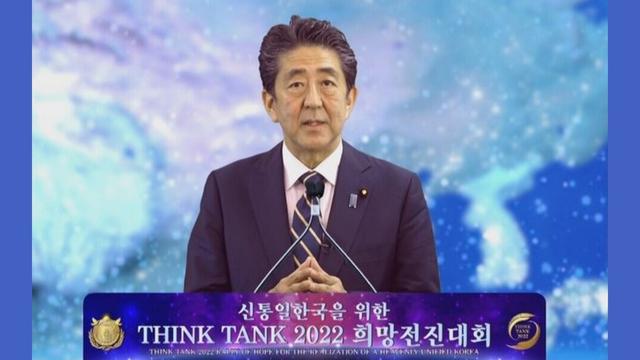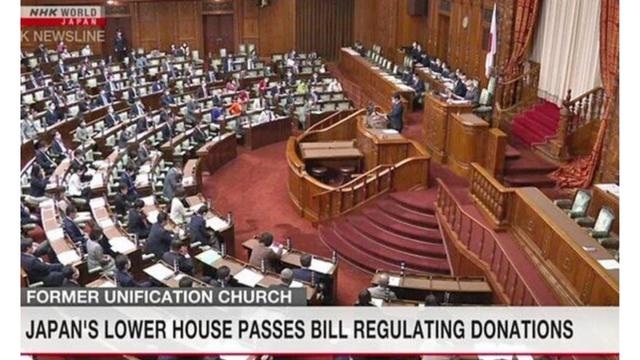The Japanese Parliament has passed laws regarding as fraudulent donations motivated by “fear” and where the “free will” of the donors has allegedly been suppressed.
by Massimo Introvigne
Article 1 of 4.


On December 10, 2022, the Japanese Parliament enacted an Act for Partial Revision of the Consumer Contract Law and an Act on Prevention of Unjust Solicitation of Donations by Juridical Persons and Others.
Untypically, the laws were passed during a weekend, which emphasized that they were regarded as urgent by the government and the parliamentarians. What, indeed, was so urgent?
On July 8, 2022, former Japanese Prime Minister Shinzo Abe was assassinated in Nara, Japan. His murderer was one Tetsuya Yamagami. His reason for killing Abe was that the former Prime Minister had participated, through a video in 2021 and by sending a message in 2022, to two events organized by the Universal Peace Federation, an NGO with general consultative status at the United Nations that is connected with the Unification Church founded by the late Reverend Sun Myung Moon. (It is now called Family Federation for World Peace and Unification, although media continue to use “Unification Church,” or “former Unification Church,” and I will follow this use).
Yamagami hated the Unification Church because twenty years before, in 2002, his mother went bankrupt, and he attributed her ruin to the excessive donations she had made to that church, of which she is still a member. Yamagami also planned to assassinate the current leader of the Unification Church, Reverend Moon’s widow Dr Hak Ja Han Moon, but finally settled for killing Abe.
Almost overnight, which cannot but raise suspicions about the previous preparation of a campaign that was looking for an opportunity to start, the opponents of the Unification Church launched a massive and unprecedented attack against the religious movement, persuading most media and, if polls should be believed, the majority of the Japanese public opinion that Reverend Moon’s organization was responsible for the crime. The twisted argument used was that, if Yamagami’s mother had not donated to the Unification Church, her son would not have had a grievance against it and would not have assassinated Abe.


The opponents of the ruling Liberal Democratic Party, of which Abe was a member, jumped on the bandwagon, including the Japanese Communist Party—which had resented for decades the successful anti-Communist activity of organizations connected with the Unification Church in Japan. An anti-cult group of lawyers opposing the Unification Church, the National Network of Lawyers against Spiritual Sales, became internationally famous almost overnight. “Apostate” ex-members of the Unification Church, including some whose stories were demonstrably false, also became celebrities and even managed to be received by Japan’s Prime Minister.
All this agitation coalesced into two legal initiatives, one aimed at depriving the Unification Church/Family Federation of its status as a religious corporation, and another at amending the existing consumer protection laws to protect those who donate excessively to religious organizations. In fact, the term “spiritual sales” had been invented by the left-wing media and the anti-cultists to expose the sale of certain artifacts believed to bring good luck or have a spiritual significance for exorbitant prices. Later, they included “sales without a material object,” i.e., donations.
On December 10, 2022, the Consumer Contract Law, which had already been amended in 2018 under the pressure from the lawyers who had denounced the “spiritual sales,” has been further amended to include provisions declaring contracts concluded by exploiting “fear for the life, health, property, and other important matters of the consumers or their relatives” void, and making it easier to cancel such contracts and obtain refunds. The provision on the right of rescinding the contracts is retroactive, unless the prescription term established by the previous law had already been completed when the new law came into force.
The new act against the “unjust solicitation of donations,” also passed on December 10, has a controversial article 3.1 that deems unlawful “suppressing the free will of individuals” when they are solicited for donations, and a list in article 4 of six circumstances indicating that the donation had not been spontaneous.
Circumstances 1 to 4 seem to refer to physical violence: those who solicit the donation refuse to leave even when asked by the potential donor; the donors themselves are prevented to leave a certain place or taken to a location where it would be more difficult for them to resist the pressure; or they are prevented from consulting with third parties, by telephone or other means, even when they have expressed the intention of doing so.
Circumstance 5 refers to an old problem, and rather than with religion deals with romantic relationships, when one of the partners threatens to leave the other if a specific donation is not made. As everybody understands, this is as common as is difficult to prevent.


The post-Abe-assassination controversies about the Unification Church are addressed by Circumstance 6, which is the most problematic. It regards as fraudulent the cases where the potential donor is solicited on the basis of an alleged “knowledge based on inspiration or other special abilities that are difficult to demonstrate reasonably,” and persuaded that “it is indispensable to donate the life, body, property, or other important matters of the individual or his/her relatives to avoid a serious disadvantage.” In this case, a “fear” is created in the donors that “serious disadvantages” may hit them or their relatives “in the present or in the future” if they do not donate.
Article 5 prohibits to donate the house where the donor lives, and real estate or other properties indispensable for continuing the donor’s normal business activities.
The remaining part of the law deals with supporting the victims of fraudulent donations, with the collaboration of “relevant organizations” (I wonder whether they would include the National Network of Lawyers Against Spiritual Sales and other groups with an ideological anti-cult agenda); the possibility for the Japanese authorities to publicize the name of the entities investigated for improper soliciting of donations; and the remedies open to deceived donors to recover what they have donated. The law is not retroactive but long terms of prescription, up to ten years, are introduced. Article 12 asks that religious liberty should be “considered” when enforcing the law but how this may happen in practice is unclear.
While some of the provisions are reasonable—certainly the use of physical violence to solicit donations should not be allowed, but I wonder whether a new law was needed for that—we should not forget that the laws, while general in scope, have been passed to target religious donations and the Unification Church. As such, they have two very problematic aspects. The first is that they forbid donations based on claims of a religious “inspiration” and on religious “fear.” The second is that they state that donors may be deprived of their free will. These matters are not new, and in fact have been debated for centuries. I will return to them in the next articles of the series.








